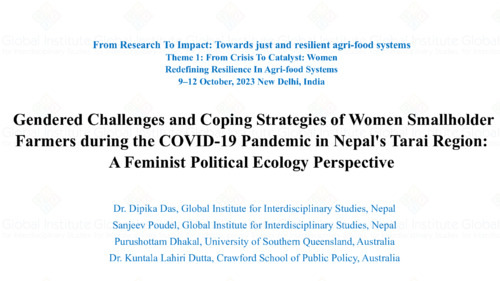Gendered challenges and coping strategies of women smallholder farmers during the COVID-19 pandemic in Nepal’s Tarai region: A feminist political ecology perspective
Abstract
This study addresses the knowledge gap regarding the specific gendered challenges faced by women smallholder farmers and the coping strategies deployed by them during the COVID-19 pandemic. The study investigates how power dynamics, gender norms and sociocultural practices at the household and community levels affected the women farmers’ coping mechanisms from a feminist political ecology perspective. It reports a study carried out in the Terai region of Nepal using mixed methods that combined quantitative and qualitative tools such as household surveys, focus group discussions, and key informant interviews. The study found that mobility restrictions disproportionately affected women farmers due to prescribed gender roles, limiting their access to input supplies and hire of agricultural labor during the pandemic. Women farmers’ ability to sell their produce in the market severely impacted their livelihoods. Gender played a critical role, as women farmers rely more than men on their social networks for livelihood support. As these networks became disrupted during the crisis, perceptions of bargaining power between female and male farmers differed. The findings emphasize the need for gender-responsive interventions and institutional support during crises. The state and supporting organizations must prioritize meeting the gender-specific needs of smallholder farmers, ensuring accessibility of essential inputs and improving market infrastructure. Information- sharing mechanisms and secure financial provisions should be established to assist farmers, particularly women, in making informed decisions and mitigating economic shocks. This study contributes to evidence- based policies and programs that promote resilience, inclusion and sustainable agricultural development.

